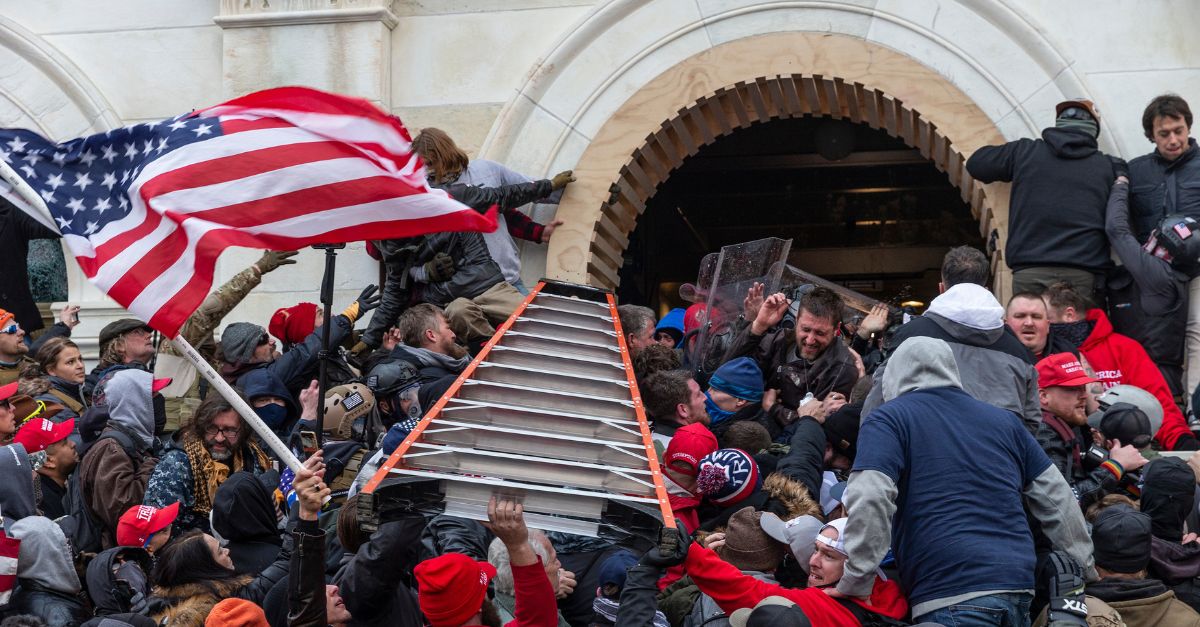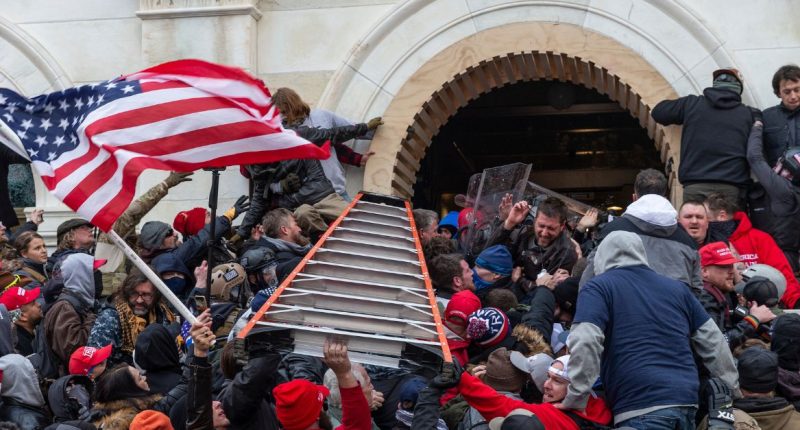
Rioters trying to enter the Capitol building through the front doors in Washington, D.C., on January 6, 2021, clash with police (Photo by Lev Radin/Sipa USA)(Sipa via AP Images).
Multiple Jan. 6 defendants are asking that the Jan. 6 honorary plaque — which was authorized by Congress to be created and installed in 2022 — also “recognize the experiences” of the over 1,500 defendants in the insurrection.
Former U.S. Capitol Police Officer Harry Dunn and Metropolitan Police Officer Daniel Hodges filed a lawsuit against Architect of the Capitol Thomas Austin earlier this month demanding the memorial plaque be installed — given that it has sat in storage since its creation in 2023. Since the June 12 complaint, at least two Jan. 6 defendants have filed a motion to intervene, asking that the plaque not just memorialize the police officers from that fateful day, but them too.
Love true crime? Sign up for our newsletter, The Law&Crime Docket, to get the latest real-life crime stories delivered right to your inbox.
A 68-year-old grandmother from New Hampshire filed her motion to “ensure that any memorialization” of that day “is equitable, inclusive, and reflective of the experiences of all individuals impacted, including myself” and other defendants.
Cindy Lou Young said she was charged with four misdemeanor counts related to her actions and given four months in jail, followed by two months of home detention and two years of probation.
“The prosecution and its aftermath had a devastating impact on my personal and financial well-being,” Young said, detailing how she allegedly lost her business, was left “financially destitute,” and has dealt with depression as well as “verbal attacks and harassment, which I believe constitute hate crimes, due to my association with the events of January 6.”
A Minnesota man, in a separate motion, is arguing he has a “direct, personal stake in ensuring the accurate historical representation of that day.”
“Moreover, the installation of any permanent public monument reflecting only the plaintiffs” [Dunn and Hodges] narrative would significantly impair his constitutional rights, damage his reputation, and mischaracterize the broader context and contested facts” of Jan. 6, reads the motion from Brian Mock, was sentenced to nearly three years in prison for assaulting four officers during the riot. As Law&Crime previously reported, Mock had said he was “at peace” with the feeling that he might die at the Capitol — and was later turned in by one of his own kids.
Both Young and Mock referenced the four people who died during the insurrection — including Ashli Babbitt, an Air Force veteran who was fatally shot during the Capitol building breach and who became a rallying symbol for those aligned with President Donald Trump.
Also noted in their motions was the fact that Trump granted some form of clemency — either a pardon or commutation of sentence — to every Jan. 6 defendant during his first day in office this year. The president’s action was celebrated by many who saw the investigations and prosecutions into the events of the day as political. To most of those who were horrified by what they witnessed and welcomed the investigations, the pardons were condemned.
House Democrats have sought to pressure Speaker Mike Johnson and other leaders to install the plaque that celebrates the police officers who defended the Capitol and the lawmakers inside it that day. The motions to include a recognition of the defendants on the plaque are sure to add a new point of controversy to the debate.








